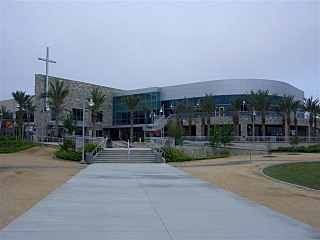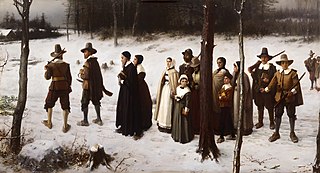
Yorba Linda is a suburban city in northeastern Orange County, California, United States, approximately 37 miles (60 km) southeast of Downtown Los Angeles. It is part of the Los Angeles metropolitan area, and had a population of 68,336 at the 2020 census.

Friends United Meeting (FUM) is an association of twenty-six yearly meetings of the Religious Society of Friends (Quakers) in North America, Africa, and the Caribbean. Its home pages states that it is "a collection of Christ-centered Quakers, embracing 34 yearly meetings and associations, thousands of local gatherings and hundreds of thousands of individuals". In addition there are several individual monthly meetings and organizations that are members of FUM; FUM's headquarters is in Richmond, Indiana, with offices in Kisumu, Kenya. Friends United Meeting is a member of the National Council of Churches in the United States of America, and is a global member of the World Council of Churches.
The Association of Vineyard Churches, also known as the Vineyard Movement, is an international neocharismatic evangelical Christian association of churches.
A Christian denomination is a distinct religious body within Christianity that comprises all church congregations of the same kind, identifiable by traits such as a name, particular history, organization, leadership, theological doctrine, worship style and, sometimes, a founder. It is a secular and neutral term, generally used to denote any established Christian church. Unlike a cult or sect, a denomination is usually seen as part of the Christian religious mainstream. Most Christian denominations refer to themselves as churches, whereas some newer ones tend to interchangeably use the terms churches, assemblies, fellowships, etc. Divisions between one group and another are defined by authority and doctrine; issues such as the nature of Jesus, the authority of apostolic succession, biblical hermeneutics, theology, ecclesiology, eschatology, and papal primacy may separate one denomination from another. Groups of denominations—often sharing broadly similar beliefs, practices, and historical ties—are sometimes known as "branches of Christianity". These branches differ in many ways, especially through differences in practices and belief.

The Evangelical Covenant Church (ECC) is an evangelical denomination with Pietist Lutheran roots. The denomination has 129,015 members in 878 congregations and an average worship attendance of 219,000 people in the United States and Canada with ministries on five continents.

John Richard Wimber was an American pastor, Christian author and musician. Initially ordained as a Quaker minister, he became an early, pioneering pastor of charismatic congregations, and a popular thought leader in modern Christian publications on the third person of the Christian Trinity, the Holy Spirit, and the Holy Spirit's action in modern churches through miraculous phenomena referred to as miracles, or signs and wonders. Wimber was a founding leader of the Vineyard Movement, a Christian movement that Kenn Gulliksen began in the United States and that later became a wider denomination.

The mainline Protestant churches are a group of Protestant denominations in the United States and Canada largely of the theologically liberal or theologically progressive persuasion that contrast in history and practice with the largely theologically conservative evangelical, fundamentalist, charismatic, confessional, Confessing Movement, historically Black church, and Global South Protestant denominations and congregations. Some make a distinction between "mainline" and "oldline", with the former referring only to denominational ties and the latter referring to church lineage, prestige and influence. However, this distinction has largely been lost to history and the terms are now nearly synonymous.

Evangelical Friends Church International (EFCI) is a branch of the Society of Friends (Quaker) yearly meetings located around the world. This branch makes up most Evangelical Quaker meetings from the Gurneyites. The EFCI is generally more conservative in their orientation than other Quaker meetings and has many similarities to other denominations of Evangelicalism. The original EFCI, known as the Association of Evangelical Friends, was formed in 1947. The EFCI adopted its current name in 2004 and is a member of the National Association of Evangelicals and the World Evangelical Alliance. Despite their differences from other Friends, they are a member of the interdenominational Friends World Committee for Consultation. After the switching of around 7,000 Friends from the Friends United Meeting in California to the EFCI, Evangelical Friends became the largest branch of Friends in the United States.

The Religious Society of Friends began as a proto-evangelical Christian movement in England in the mid-17th century in Ulverston. Members are informally known as Quakers, as they were said "to tremble in the way of the Lord". The movement in its early days faced strong opposition and persecution, but it continued to expand across the British Isles and then in the Americas and Africa.

There are about 180,000 members of the Religious Society of Friends, or Quakers, in Africa. African Friends make up around 49% of Friends internationally, the largest proportion on any one continent. Kenya has the largest number of Quakers in a single nation—about 119,000 in the year 2017. The three main denominations of Friends, Friends United Meeting, Friends General Conference, and Evangelical Friends Church International, all have affiliated Yearly Meetings (associations) in Africa. There are also independent meetings in several African nations.

Yearly Meeting is an organization composed of constituent meetings or churches of the Religious Society of Friends, or Quakers, within a geographical area. The constituent meetings are called Monthly Meetings in most of the world; in England, local congregations are now called Area Meetings, in Australia Monthly Meetings are called Regional Meetings. "Monthly" and "Yearly" refer to how often the body meets to make decisions. Monthly Meetings may be local congregations that hold regular Meetings for Worship, or may comprise a number of Worship Groups. Depending on the Yearly Meeting organization, there may also be Quarterly Meetings, Half-Yearly Meetings, or Regional Meetings, where a number of local Monthly Meetings come together within a Yearly Meeting.

Quakers are people who belong to the Religious Society of Friends, a historically Protestant Christian set of denominations. Members refer to each other as Friends after John 15:14 in the Bible, and originally, others referred to them as Quakers because the founder of the movement, George Fox, told a judge to quake "before the authority of God". The Friends are generally united by a belief in each human's ability to be guided by the inward light to "make the witness of God" known to everyone. Quakers have traditionally professed a priesthood of all believers inspired by the First Epistle of Peter. They include those with evangelical, holiness, liberal, and traditional Quaker understandings of Christianity, as well as Nontheist Quakers. To differing extents, the Friends avoid creeds and hierarchical structures. In 2017, there were an estimated 377,557 adult Quakers, 49% of them in Africa followed by 22% in North America.

The Evangelical Christian Church(Christian Disciples) as an evangelical Protestant Canadian church body. The Evangelical Christian Church's national office in Canada is in Waterloo, Ontario.

Mariners Church is a non-denominational, Christian megachurch located in Irvine, California, situated in central Orange County, and as of 2022 was the 41st largest church in the United States by number of attendees as well as one of the fastest growing.

Christianity is the most prevalent religion in the United States. Estimates from 2021 suggest that of the entire U.S. population about 63% is Christian. The majority of Christian Americans are Protestant Christians, though there are also significant numbers of American Roman Catholics and other Christian denominations such as Latter Day Saints, Eastern Orthodox Christians, Oriental Orthodox Christians, and Jehovah's Witnesses. The United States has the largest Christian population in the world and, more specifically, the largest Protestant population in the world, with nearly 210 million Christians and, as of 2021, over 140 million people affiliated with Protestant churches, although other countries have higher percentages of Christians among their populations. The Public Religion Research Institute's "2020 Census of American Religion", carried out between 2014 and 2020, showed that 70% of Americans identified as Christian during this seven-year interval. In a 2020 survey by the Pew Research Center, 65% of adults in the United States identified themselves as Christians. They were 75% in 2015, 70.6% in 2014, 78% in 2012, 81.6% in 2001, and 85% in 1990. About 62% of those polled claim to be members of a church congregation.

Christianity is the dominant religion in Kenya, adhered to by an estimated 85.5% of the total population. Islam is the second largest religion in Kenya, practiced by 10.9 percent of Kenyans. Other faiths practiced in Kenya are Baháʼí, Buddhism, Hinduism and traditional religions.

Christianity was introduced to North America as it was colonized by Europeans beginning in the 16th and 17th centuries. The Spanish, French, and British brought Roman Catholicism to the colonies of New Spain, New France and Maryland respectively, while Northern European peoples introduced Protestantism to Massachusetts Bay Colony, New Netherland, Virginia colony, Carolina Colony, Newfoundland and Labrador, and Lower Canada. Among Protestants, adherents to Anglicanism, Methodism, the Baptist Church, Congregationalism, Presbyterianism, Lutheranism, Quakerism, Mennonite and the Moravian Church were the first to settle in the US, spreading their faith in the new country.

Christianity was introduced with the first European settlers beginning in the 16th and 17th centuries. Colonists from Northern Europe introduced Protestantism in its Anglican and Reformed forms to Plymouth Colony, Massachusetts Bay Colony, New Netherland, Virginia Colony, and Carolina Colony. The first arrivals were adherents to Anglicanism, Congregationalism, Presbyterianism, Methodism, the Baptist Church, Calvinism, Lutheranism, Quakerism, Anabaptism and the Moravian Church from British, German, Dutch, and Nordic stock. America began as a significant Protestant majority nation. Significant minorities of Roman Catholics and Jews did not arise until the period between 1880 and 1910.














